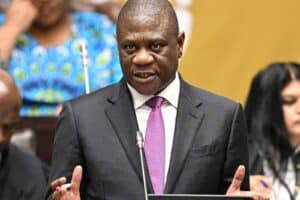Only 18 municipalities out of 278 received a clean audit, Auditor-General Kimi Makwetu said, with 63 municipalities regressing, while 22 improved.

Intimidation, outright threats, refusal to comply with relevant legislation, and ignoring advice from auditors by local government had resulted in an overall regression in municipal performances – causing only 18 municipalities out of 278 to receive a clean audit.
In 2017-18, 33 municipalities had received clean audits, Auditor-General Kimi Makwetu said, with 63 municipalities regressing, while 22 improved.
Makwetu’s office audited 257 municipalities and 21 municipal entities.
In his reply to the debate on the State of the Nation address, President Cyril Ramaphosa said in local government, “as in all parts of the state, where systems fail, there must be accountability”.
“Through interventions like the National Clean Audit Task Team under the Hawks we are serious about cleaning up our municipalities so they can fulfil their primary mandate – not to adjudicate tenders, but to deliver services,” Ramaphosa said.
Makwetu said only 19% of the municipalities could give financial statements without material misstatements.
“Not only did the unqualified opinions on the financial statements decrease from 61% to only 51%, but the quality of the financial statements provided for auditing was even worse than in the previous year,” Makwetu said.
The performance reports of 65% of the municipalities which produced reports had material flaws and were not credible enough for the council or the public to use, he said.
There was material noncompliance with key legislation at 92% of the municipalities – an increase from 85% in 2017 – while municipalities with material compliance findings on supply chain management increased from 72% to 81%.
Irregular expenditure decreased from R29.7 billion to R25.2 billion. The reported total included the R4 billion irregular expenditure “of those municipalities of which the audits had not been completed by the cut-off date”.
“The amount could be even higher, as 46% of the municipalities were either qualified on the incomplete disclosure of irregular expenditure or disclosed in the financial statements that they did not know the full extent of irregular expenditure,” Makwetu said.
- Cosatu spokesperson Sizwe Pamla said the AG’s findings were “appalling, frightening and deeply worrisome”. “This confirms the fact that there is little control over the corrupt abuse and manipulation of tenders and procurement of goods and services,” Pamla said. “All this shows there is virtually no appetite to abide by the laws across the country. What is even more depressing is that there are virtually no consequences for those responsible.”
- Faith Ngwenya, technical and standards executive at the South African Institute of Professional Accountants, said professionals had to be placed within municipalities. “They must understand the three tiers of government, the role of municipalities, and less cadre deployments,” Ngwenya said. “This has devastating effects for municipalities that do not have a huge budget and have to achieve a lot with the few people available.” Ngwenya said if chief financial officers were incompetent and not professionally fit, the decline would continue.
Makwetu said the 2017-18 report dealt with the financial year ended June 30, 2018. This preceded the amendments to the Public Audit Act, which became effective on April 1.
“Accordingly, the requirements of these amendments will be applicable for the first time to audit reports issued for the financial years that ended on or after March 31,” Makwetu said.
The AG’s rogues gallery
Auditor-General Kimi Makwetu yesterday tore into Free State provincial management over its financial management, saying the province’s financial crisis was becoming a critical concern.
“The Free State local government environment displayed a total breakdown in internal controls as the province’s political and administrative leadership, yet again, exhibited no response to improve their accountability,” Makwetu said. “The leadership did not implement our recommendations, despite their commitment to do so.
“The required level of oversight was non-existent at most municipalities and we doubt if there is political will to do the right thing for the right reason, mainly due to political interference.”
Despite having 12 of the 18 municipalities with clean audits, the Western Cape did not excape unscathed. “The province’s audit outcomes reflect a significant regression, which largely related to procurement,” said Makwetu.
The AG attributed the regression to municipalities being slow to implement his office’s recommendations and “not taking heed of the emerging risks that we reported”.
Makwetu said Gauteng local government had one municipality obtaining a clean audit. “We commend Midvaal for sustaining a clean audit outcome for the last five years. This was as a result of the municipality institutionalising a number of best practices, such as timeously monitoring the implementation of action plans to ensure that internal control deficiencies are addressed.
“Encouragingly, 100% of Gauteng municipalities have obtained a financially unqualified opinion for the past three years.”
Nelson Mandela Bay received a qualified opinion for the seventh year in a row.
“The City of Tshwane disclosed in its financial statements that a material uncertainty existed, which might cast doubt on its ability to continue operations for the next 12 months without financial assistance,” said Makwetu.
“This was due to multiple negative financial indicators, including a net current liability position, with liabilities exceeding current assets by R2.169 billion.”
For more news your way, download The Citizen’s app for iOS and Android.






